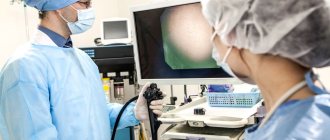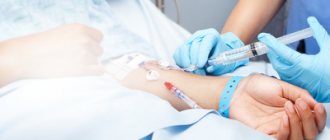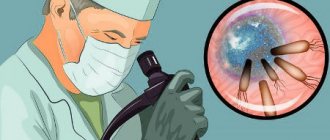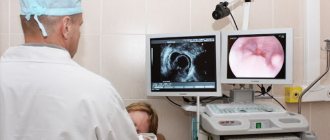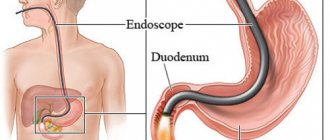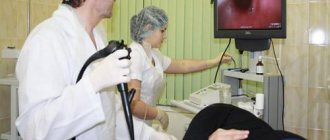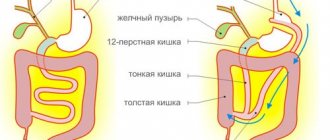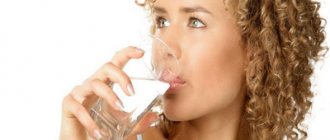Indications
Fibrogastroduodenoscopy is performed if there are problems with the gastrointestinal tract, to examine all organ cavities and identify pathological changes in them. The specialist studies the condition of the mucous membranes of the duodenum, stomach, and esophagus. The patient goes to the physiotherapy office of the hospital institution on the direction of his gastroenterologist, who should tell him how to properly prepare for the procedure.
Indications for FGDS are the following symptoms:
- painful sensations in the peritoneum;
- heartburn;
- sour belching;
- heaviness in the epigastric zone;
- nausea, in most cases ending in vomiting;
- removal of sputum, which may contain bloody impurities;
- rapid weight loss with the same appetite, etc.
Fibrogastroduodenoscopy is prescribed not only to identify various pathologies, but also for the purpose of their treatment. Thanks to a special endoscope instrument, the doctor examines the gastrointestinal tract, collects biological material, and carries out therapeutic manipulations.
Consultation with a doctor
In consultation with a doctor before performing an FGDS, you must inform about:
- all chronic and other diseases;
- temporary ailments;
- medications taken.
The health worker, in turn, must:
- find out if there are any contraindications to the procedure;
- carry out tests for allergic reactions to anesthetics;
- tell in detail about the stages, algorithm and features of the manipulation;
- if necessary, review the patient’s medical history and tests.
The “Stomach Hurts” channel has prepared a video that offers a list of indications and contraindications for performing an FGDS.
Who is not prescribed FGDS?
Despite the fact that fibrogastroduodenoscopy is one of the most informative diagnostic techniques, there are a number of contraindications to its implementation. It is prohibited to perform studies on patients with the following pathological conditions:
- mental disorders;
- heart attacks or strokes;
- hypertensive crisis;
- chronic infectious diseases of the gastrointestinal tract during exacerbation;
- unconscious state;
- pathologies in the hematopoietic system;
- previous surgical intervention on the larynx;
- exacerbated asthma (bronchial).
For patients who have the above diseases, specialists select safer diagnostic methods. But, if the result of FGDS is vital for the patient, he is examined regardless of his condition.
Alternative to FGDS
Gastroenterologists may prohibit a patient from undergoing gastroscopy, but there must be objective reasons for this. In this case, the patient may be prescribed an alternative study:
- computed tomography;
- MRI;
- capsule endoscopy;
- duodenal intubation;
- barium radiography.
But these methods cannot provide a guaranteed accurate result.
Before the FGDS procedure, each patient should take preparations for this procedure more seriously, having previously familiarized himself with the special requirements. The technique will allow the doctor to establish an accurate diagnosis and prescribe effective treatment. Be healthy!
Features of the procedure
In order for the diagnostic study to be as effective as possible, the patient must fulfill a number of requirements:
- Clean mucous membranes . For several days, foods whose fragments can linger on the stomach walls are excluded from the diet. The list needs to be replenished with seeds, chocolate, nuts, etc.
- Correct and calm breathing . If you follow all the specialist’s recommendations, the process of inserting the endoscope will not be associated with severe discomfort and pain.
- Empty stomach . This requirement is due to the fact that during diagnostic procedures people have natural gag reflexes. If at this moment there is food in the organ, it will quickly begin to come out. Since the patient at this stage has already been inserted into a flexible tube that blocks the lumen of the larynx by more than half, he may choke on his own vomit.
- It is forbidden to brush your teeth before gastroscopy, smoke or drink water (in case of severe hunger, 0.5 glasses of clean water are allowed 3-4 hours before diagnostic procedures).
- Positive psychological attitude . If a person experiences a feeling of fear, he will not be able to relax, resulting in spasm of the smooth muscles. Due to tightness, a specialist may accidentally injure the patient’s esophagus or stomach during the insertion of endoscopic equipment.
STAGE OF PREPARATION FOR FGS AND ITS FEATURES
A significant role in gastroscopy is given to the preparation stage. The quality of the final results depends on the correct preparation. If the patient comes for gastroscopy unprepared, the doctor may cancel the study. Let’s find out in more detail where to start preparing.
Initially, it is important to know that the procedure is carried out exclusively on an empty stomach. Before gastroscopy of the stomach, you should stop eating and drinking 8 hours before. If the study is planned for the morning, then you need to eat in the evening. For two days before gastroscopy, the patient should eat exclusively light and low-fat foods. You should also not eat spicy or hot foods, which will damage the walls of the gastrointestinal tract. Foods that contribute to gas formation should be excluded from the diet:
- milk;
- legumes;
- fruits;
- vegetables.
Fruits and vegetables should be consumed boiled, but not fresh. It is strictly unacceptable to drink alcohol on the eve of the study, which will lead to the failure of the study.
Often patients have a question about whether it is possible to brush their teeth before the FGDS procedure? The question arises in the morning, when every morning a person, out of habit, goes to the bathroom to brush his teeth. You can brush your teeth on the eve of gastroscopy, but you should not use toothpaste. You are only allowed to rinse your mouth with plain water without swallowing it. If you brush your teeth with toothpaste, it will provoke an increase in the development of the gag reflex. Doctors rarely mention this important point, although cleaning pastes negatively affect the research process itself.
It is important to know! Before the procedure, you should also not chew gum or other single products to remove bad breath.
Smoking is strictly prohibited on the day of gastroscopy. Although cigarettes relax the nervous system, as a result of which a person becomes less irritable, smoking them the day before will result in the doctor being unable to conduct an examination. Nicotine is a dangerous chemical that causes increased permeability of blood vessels. The study does not rule out the development of bleeding, which is one of the main causes of complications after FGS.
You should not take medications before the examination procedure. If you take pills strictly on schedule, you should notify your doctor in advance. Before leaving the house, you need to wear clothes that will not restrict your movements.
In the gastroenterology office, before swallowing the tube, you should remove the following items from yourself:
- prostheses;
- lenses;
- glasses;
- watch;
- chains.
This is done so that these items do not interfere with the gastroscopic examination. If during the examination the patient becomes ill, the doctor should be warned about this using gestures.
Interesting to know! Although a gastroscopic examination is an unpleasant procedure, it takes place quite quickly that patients do not even have time to feel the hoses passing through the esophagus.
If you know that you have an allergy, you need to warn your doctor about it. Occasionally, patients are allergic to lidocaine, which is sprayed into the mouth before swallowing the probe. The development of allergies during the study is unacceptable, as this can be fatal.
Teeth cleaning
Gastric secretion can be triggered by nicotine entering the organ during smoking, chewing gum, which stimulates the production of acids, and brushing teeth. Gastroenterologists prohibit patients from performing oral hygiene using any pharmaceutical or self-prepared products before an endoscopic examination.
Before FGDS of the stomach, it is not recommended to even remove plaque from the surface of the enamel with a clean brush. This is due to the fact that patients’ gag reflex often increases during hygiene procedures. It is also worth noting that the use of powders and pastes to cleanse teeth can lead to distortion of the results of hardware research. For example:
- the composition of the microflora, which is collected during fibrogastroduodenoscopy for inflammation of the gastric walls, will change;
- acid-base balance, the composition of which is studied if there is a suspicion of disturbances in the production of hydrochloric acid (if a person decides to brush his teeth, fragments of paste or powder may enter the stomach).
Contraindications for the study
If the first gastroscope was an elastic tube with a binocular apparatus, into which the doctor looked during the examination, today this apparatus has been replaced by a modern TV monitor. The doctor only needs to move the hose and monitor the process on the monitor.
It is important to know! Despite the invention of modern gastroscopes, many clinics still use older versions.
If you have a certain list of diseases, gastroscopy is prohibited until a certain time of recovery. Such contraindications are:
- 1. Blood diseases.
- 2. Mental disorders.
- 3. Acute infectious diseases.
- 4. Bronchial asthma.
- 5. The patient's serious condition.
Before swallowing the probe, the doctor assesses the patient’s condition and level of preparedness. If the patient absolutely cannot swallow the probe, then the question of examination under general anesthesia is raised.
Examination of the gastrointestinal tract is not painful, so patients should not worry or be afraid. For suspicious patients who cannot swallow the tube through the mouth, a transnasal gastroscopy procedure is proposed. This is a similar procedure, but the gastroscope is inserted through the nasal passages. There is also the possibility of performing gastroscopy during sleep, as well as capsule examination. The last version of the study involves swallowing a capsule with a camera that passes through the gastrointestinal tract and records information. The cost of such research is tens of times higher than traditional methods.
It doesn’t matter which method of examining the gastrointestinal tract will be used, because the most important thing is proper preparation of the patient. All that is required of the patient is to prepare and appear at the appointed time.
What about chewing gum?
Before fibrogastroduodenoscopy, many people begin to feel complex due to the stench emanating from the oral cavity. They are embarrassed by the fact that at the time of diagnostic measures, highly specialized specialists will feel the stench caused by food fragments remaining between the teeth and on the surface of the tongue.
There is no need to try to solve the problem by chewing gum, as they stimulate the active production of gastric juice, which is extremely undesirable during FGDS.
Using additional oral hygiene products
Know! We have sorted out the fact that brushing your teeth before gastroscopy is allowed, while being careful.
But what about other products designed to care for the oral cavity? After all, many people are accustomed to using mouthwash and chewing gum every day to freshen their breath.
As for the rinse aid , it to refuse it on the day of the study .
If the ingestion of toothpaste can be controlled, then a small amount of rinse aid will still enter the stomach, thereby distorting and complicating gastroscopy.
If we talk about chewing gum , it is also prohibited.
The problem is that when chewing gum, active salivation is observed, resulting in the release of gastric juice.
Stay up to date! To get a reliable gastroscopy result, it is better to rinse your mouth with water in the morning, trying not to swallow it.
Alternative methods of oral debridement
To eliminate the unpleasant odor, patients can use special liquids sold in pharmacy chains to sanitize the oral cavity. When used correctly, they will not only provide fresh breath, but also destroy germs, as they have an antibacterial effect. Also, for these purposes, experts recommend using sprays that can completely replace chewing gum. If patients use rinsing solutions and refreshing sprays to eliminate unpleasant odor from the oral cavity, then they need to ensure that they do not swallow liquids, since their components, after penetrating into the gastrointestinal tract, can distort the results of studies.
How to properly prepare for gastroscopy for an adult?
The course and outcome of the study depends on how to prepare for gastroscopy. Everyone must prepare – doctor and patient. We will only talk about the algorithm for preparing a patient for endoscopic examination of the esophagus and duodenum. It is not complicated, but has some nuances.
Diet before the study
The main recommendation is related to the last meal - it is recommended to eat 8-10 hours before FGDS, and drink water or tea 4 hours before . When performing gastroscopy under anesthesia or sedation, you must fast for 12 hours.
Help Refusal to eat is due to the fact that during FGDS vomiting develops, which can only be stopped if the stomach is empty. But this is not the main thing, the main thing is that vomit can get into the cavity of the trachea or bronchi. This is fraught with the development of aspiration pneumonia or, in the most extreme cases, asphyxia (suffocation) with vomit. In addition, if the food does not have time to be completely evacuated before gastroscopy, the doctor will not be able to fully see the walls of the organ.
However, like any preparation, it has an individual approach. Nutritional rules before gastroscopy for various diseases:
| Disease | How many hours have you gone without eating? | Note |
| Diabetes mellitus insulin dependent | 5-8 hours (depending on the patient’s condition) | The study should be carried out early in the morning or during the day, so that the patient can already have breakfast |
| Liver cirrhosis, hepatitis | 5-8 hours | It is better to conduct the study during the day so that the patient has breakfast and takes medications. |
| Conditions accompanied by insufficient glucose production | 4-6 hours | It is forbidden to exclude the main therapy on the day of the procedure, as well as to carry it out in the morning. |
| Conditions in which organ glucose uptake is increased ( hyperinsulinism ) |
These diseases are associated with the development of severe hypoglycemia - low blood sugar. Such patients must eat frequently and are prohibited from fasting. The endoscopist must be promptly notified of such conditions.
Please note: If it so happens that you have already eaten before gastroscopy , refuse it. Do not induce artificial vomiting under any circumstances. This is dangerous to health, and will also change the condition of the mucous membrane of the digestive tract; the results of the study will be unreliable.
Prohibited Products
Proper preparation begins with eliminating certain foods two days before the test. First of all, these are products that increase acidity and gas formation .
You should not eat smoked, salted, canned foods , and you should also exclude fatty and spicy foods.
What not to eat on the eve of gastroscopy:
- tomatoes or tomato juice – increases acidity;
- all representatives of legumes stimulate gas formation;
- cabbage in any form or cabbage juice - a large amount of fiber can injure the walls of the stomach and intestinal mucosa during exacerbation of the underlying disease; in addition, it worsens the course of thyroid diseases due to the abundance of selenium and zinc in cabbage;
- potatoes , since they are most often consumed fried, and solanine contained in potato peels can cause symptoms of acute poisoning;
- strong black or green tea – increases the acidity of the stomach (green tea is most often contraindicated for gastrointestinal diseases);
- chocolate, cocoa and other cocoa-containing products - stimulates the production of gastric juice with a high content of hydrochloric acid, cocoa butter is difficult for the stomach to digest, thickeners, acidity regulators also affect gas formation.
Separately, it is worth noting the complete refusal of coffee. Caffeine is a psychostimulant that also has analeptic properties. As a psychostimulant, it increases the activity of the cerebral cortex, increases physical activity and improves mood. As an analeptic, it speeds up breathing and increases the heart rate.
Taken together, these properties before FGDS contribute to an increase in nervousness and anxiety . Against the background of such a state, it will be difficult to calm down and listen carefully to the doctor. In addition, it can cause nausea and vomiting, and also increases the acidity of gastric juice . For the same reason, all products containing caffeine are excluded.
Important Also, 2-3 days in advance, you should completely give up alcoholic beverages.
Sample menu
To make it easier for you to navigate, we have compiled a sample menu for two days.
Dried fruit compote – 250 ml;
Rose hip decoction – 250 ml.
Steamed beef cutlet – 1 piece;
Rose hip decoction – 250 ml.
Diet correction depends on the type of underlying disease.
What is possible and what is not possible before the procedure?
In this paragraph, we will answer the most frequently asked questions from patients regarding the algorithm for preparing a patient for fibrogastroduodenoscopy in nursing.
Drink water, tea or coffee
As mentioned earlier, you should completely avoid coffee and caffeine-containing drinks. You can only drink herbal tea , and preferably gastric tea No. 3. But they should not be abused: no more than 2 times a day. If we talk about black tea, then:
- for gastritis with hydrochloric acid deficiency (hypoacid), black tea is useful;
- for gastritis with high acidity (hyperacid), the consumption of the drink should be limited.
You can drink water before the examination 3-4 hours before gastroscopy, however, if it is scheduled for the first half of the day, this should not be done in the morning. Carbonated sweet drinks are completely excluded.
Brush your teeth
Brushing your teeth before FGDS in the morning is not only possible, but also necessary. Since bacteria accumulated overnight can enter the esophagus, stomach or intestines along with the gastroscope. This may pose some danger in hypoacidnomastritis (with insufficiency of hydrochloric acid). In addition, during gastroscopy the throat is often damaged , so bacteria can provoke full-fledged inflammation.
When brushing, try not to damage the mucous membranes of the mouth and gums , and also avoid swallowing toothpaste.
Chew gum
Absolutely not, especially on an empty stomach. Chewing gum causes a reflex increase in stomach acidity.
Smoking
You should stop smoking 1-2 days before FGDS. This is due to the pharmacological effects of nicotine:
| Target | Influence |
| Medulla | Stimulation of the respiratory and vasomotor centers, that is, breathing and heart rate increase |
| Adrenal cortex | Increased release of adrenaline leads to increased blood pressure |
| Brain | Stimulates the cerebral cortex |
| Vomiting center | Nausea, vomiting |
| Intestines | Improves motor skills |
| Glands | Stimulates the functioning of the salivary, bronchial and gastric glands |
Also give up nicotine-containing chewing gum , for example, Nicorette 1-2 days before the procedure.
Medicines
Taking medications must be agreed with your doctor.
In case of coronary heart disease, it is better to take medications before gastroscopy, but in advance with the approval of the endoscopist.
The day before gastroscopy, you should not take drugs that stain the gastric mucosa, these include de-nol and activated carbon.
Important If you are taking medications regularly and cannot stop taking them, inform your endoscopist about this.
What medications can you take?
To reduce gas formation you can use:
- Creon;
- Espumisan;
- Festal;
- Sorbex.
The dosage, duration of use, as well as the form of the drug should be agreed with the attending physician.
Do not self-administer antiemetics . If you have an active gag reflex, tell your doctor.
Sedatives can be used as a sedative:
- valerian preparations ;
- motherwort tincture.
The use of bromine salts is resorted to in cases of increased emotional lability. This means that a person cannot sleep, he develops neurosis and irritability. Then you should think about gentle gastroscopy methods.
How to prepare mentally?
Surely everyone has heard the phrase: “all diseases come from nerves,” and this is true. Against the background of nervousness, blood pressure rises, nausea and sometimes vomiting appear, and the underlying disease can worsen the condition . Several important recommendations that will help you mentally prepare for the procedure:
- do not listen to the stories of other people: human psychology is such that he wants to show what unimaginable obstacles he has gone through, so he will most likely greatly embellish the reality ;
- do not read forums where you will be intimidated by messages about the dangers of FGDS: according to statistics, all complications develop no more than 1% of all cases ;
- If you are very afraid, tell your doctor about it in advance so that he can prescribe sedatives ;
- do not be afraid of pain, as modern local anesthetics ; You can also undergo the procedure under sedation or anesthesia. This is normal practice in European clinics.
- immediately before the manipulation discuss with the endoscopist how to inform him if the condition worsens during FGDS.
Fear is a common feeling before the EGD procedure in many patients. You can read more complete information about how to undergo an FGDS as painlessly as possible in this article.
A real review from a girl about the FGDS procedure:
